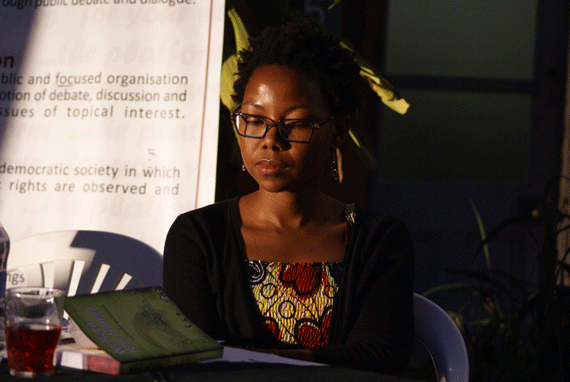
SAN FRANCISCO — NoViolet Bulawayo left Zimbabwe at 18 to study law in America, but a series of photos changed her plans.
The pictures showed people displaced by a 2005 government cleanup operation; the first one Bulawayo saw — of a child sitting on the rubble of his bulldozed home — inspired her debut novel, We Need New Names.
The book was shortlisted for last year’s Guardian First Book Award. When they published an excerpt, they also ran an introduction, in which she said: “I became obsessed with where the people would go, what their stories were, and how those stories would develop — and more importantly, what would happen to the kid in the first picture I saw. The writing project essentially became about finding out.”
Told from the perspective of a 10-year-old, We Need New Names was on many year-end “best of” lists, and Bulawayo was selected as one of the National Book Awards’ “5 Under 35.” She also became the first black African woman and the first Zimbabwean to be short-listed for the Man Booker Prize.
In a recent phone interview, she said she chose a child’s point of view for different reasons.
“One of them is that I am really interested in children’s voices, being that they are not powerful in any society,” she says.
“They are voices unheard. Nobody ever asks for their opinions, yet they are living in and suffering and dealing with cultural questions that are created by adults. So I just wanted to do a project where children try to speak their own wisdom to our world.”
Now 32 and a Stegner Fellow at Stanford University, Bulawayo says she experienced “a normal childhood, when the country was functioning”. The story is at once hers and something larger than hers.
- Chamisa under fire over US$120K donation
- Mavhunga puts DeMbare into Chibuku quarterfinals
- Pension funds bet on Cabora Bassa oilfields
- Councils defy govt fire tender directive
Keep Reading
“One of the lessons that I learned and that was quite profound for me as a young writer is you start to tell your story and you realise that you really don’t own it, that it’s also somebody’s story,” she says.
“And especially now that the book is out, people will e-mail and say, ‘You know, I relate.’ So I guess going forward, I will be more aware of the power of what I do, whereas when I was getting into it, I just wanted to tell a story.”
Bulawayo will read as part of WritersCorps’ annual live event, in which the organisation spotlights some of the work being done by its students and their teaching artists — this year, Roseli Ilano and Harold Terezón. WritersCorps puts writers in community settings to teach creative writing to youth.
“I’ve worked with young writers in different capacities,” Bulawayo says, “and I’m always terrified, in a good way — terrified by their quiet power, because you know that, ‘OK, these kids are going to be adults tomorrow.’ They are going to be making decisions, taking charge of our communities and our world.
“And knowing that everything that they encounter, including this opportunity to read and write their own stories and share their voices, can go a long way. And on that note I’m just excited to be working with them.
“I never got this kind of opportunity when I was growing up. It never occurred to me that I could grow up and be a writer, and looking back, if ever I had met with writers like these kids have the opportunity to do, I think I may have come into myself even earlier, or gone about this business with more courage.”
— http://www.sfgate.com










